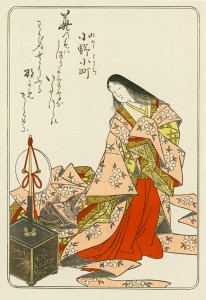 Ono no Komachi was born in 825 and her name is synonymous with beauty even today in modern Japan. She was a waka poet and is listed amongst the 36 immortals of poetry in Japan, those who wrote during the Nara, Asuka and Heian periods. Her poetry was often passionate and generally erotic, and was thought to eclipse the work of most of her female contemporaries.
Ono no Komachi was born in 825 and her name is synonymous with beauty even today in modern Japan. She was a waka poet and is listed amongst the 36 immortals of poetry in Japan, those who wrote during the Nara, Asuka and Heian periods. Her poetry was often passionate and generally erotic, and was thought to eclipse the work of most of her female contemporaries.
There is little that we know of Komachi during her lifetime – her birth place is not known and much of what is gleaned about her is considered part of her legend. She was thought to be an incredibly beauty and the target of many a suitor in her youth, though she was also said to be cruel and only too aware of her power over men.
One historical probability which has credence is that she was born into a literary family and that she served as an attendant to the emperor of the time. Part of her legend also suggests, however, that she was punished for being so vain and cruel by having to live to a very old age, her face ravaged by the passing of time.

Within the high circles of Heian society there is no doubt that she was considered a major poet of the time. When the Imperial Office collected all the greatest Japanese poets together in one anthology, called the Kokinshu, in 905, Komachi’s verses were amongst those chosen.
Waka poetry is also known as Yamato Uto and is one of the main genres of classical Japanese verse. It originally started out as a mixture of styles from short and long poems, verses that were typified as “whirling head poems” and fragment poems. All but the short poem, or tanka, had fallen into disuse by the time that Komachi began writing her verse.
Much of the waka poetry attributed to Komachi explores both solitude and anxiety but also passion and love. Whilst she was said to be cruel to her suitors, many legends abound of Komachi in love and the most famous is probably with courtier Fukakusa on Shosho who she promised to marry if he visited her each of 100 nights one after the other. He succeeded on all but one of the last nights at which point he fell into a state of despair and died. Komachi is said to be crestfallen at news of his death.

Nothing much is known of Komachi in later life except that she was supposed to have lived to a very old age as punishment for her cruelty to her suitors and her vanity. On the contrary, her poems show no real evidence of her cruelty, more a woman who was passionate, anxious and given to periods of loneliness.
According to legend she lived as an old, lunatic crone outside the city and died around the year 900.

